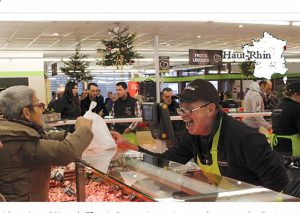. . SUSTAINABLE DEVELOPMENT . .
An article from Jeunes Agriculteurs
Coeur paysan (literally farmer’s heart) is the name of an ambitious project of 35 farmers who have joined toegher to sell their products directly. Their store is in Colmar, in an old Lidl supermarket. A real symbol.

Colmar, December 6, 2016. The persistent mist accentuates the cold of winter that is already biting. But the occupants of the 82-84 Neuf-Brisach Road are not cold. In this former Lidl, supermarket, closed more than two years ago ,people are busy and in good humor. We cut meat, we place cheeses in the showcases, we stick on the last labels … These are the 35 producers who have invested in these walls to market their products directly. The opening preview is scheduled for 3:00.
The old Lidl is transformed to Coeur Paysan. A rea; symbol! Colmar, wotj ots 70,000 inhabitants, finally has its market of local producers. The locals can buy fruits and vegetables, cheeses, dairy products, meat, bread, etc. The farmers themselves sell the product, working in the store half day per week. A classic operation for a grocery store. What is less important is the size of the project, which required 1.5 M € of investment. This was necessary to renovate the premises, to buy equipment (showcases, boxes, etc.), to invest in communication. As soon as it opened, the store employed six people.
Better valuation. With 35 farms, Coeur Paysan offers a range of products ranging from wild game to teas, snails and smoked trout. These are an asset to achieve the ambitious objective set by the group: to achieve a turnover of 2.5 M € per year. “The hard core of the group is a team of entrepreneurs,” says Nicolas Guibert, tasting his organic goat cheese produced in Linthal, 35km away. “The hardest part is finding a team,” he says jovially. The group met and worked very quickly: the project was completed in eight months, compared to the usual two years preparation for this type of store.
Thirty of the suppliers are now shareholders of SAS Cœur Paysan, which manages the point of sale. The investment – financial and time (sales) – varies according to the turnover expected by each producer. Six of the shareholders bought the building, via an SCI. “We wanted to be independent,” says Denis Digel, President of SAS Cœur Paysan. It is up to us to take our destiny in hand. “As initiator of the project, he is also president of the cooperative of market gardeners of Sélestat. It was “the desire for proximity with consumers” that guided this union leader. A rapprochement synonymous with better valorisation, because “we, the producers, do not draw our chestnuts from the fire!”, he insists.
(Article continued on the right column)
(Article continued from the left column)
Battle of the image. Between the riesling of the Domaine Rieflé and the beer of the brewery Saint-Alphonse, a poster proclaims: “Behind every product, there is a producer.” For, beyond the valorization of products, there is a battle of images. In this struggle, farmers have the key cards: “Consumers want to see and touch the producer,” says Denis Digel. Distributors like Intermarché, have understood this, as they claim to be a “producer-trader”. With Cœur Paysan, the farmers have responded in their own way. Modern and rustic, the visual identity of Cœur Paysan, developed by a communication agency, is widely available in the store, on the clothes of sellers and on the Internet. Upon entering the store, customers come across a large sign presenting all the producers.
Inevitably, some people are disturbed. To those who accuse him of overshadowing supermarkets, Denis Digel replies: “We are responding to a new demand that retailers are unable to satisfy.” We fill a need in Alsace. “The proof with Fabien Barre. This young farmer, newly installed in 2014, was looking for a new and secure outlet for his organic goat cheeses. For this farmer, the store has the advantage of “not competing with the goat farmers already on the market”. And it corresponded to his wish to “offer local products directly to the consumers at a correct price.”
Installed in the village of Soultzeren, Fabien transforms into cheeses the whole milk produced by his 60 goats, which allows him to fix his own prices. His goal ? “10 to 20% of my turnover to Cœur Paysan would not be bad. The shop could thus take over from one of the three markets where I am now selling. “Between the cheese-making and its sale,” I have less time with my goats,” he regrets. This is why he is considering to hire someone to help “A project like this comes only once in a lifetime; I don’t want to waste the opportunity.
(Thank you to Kiki Chauvin, the CPNN reporter for this article.)O